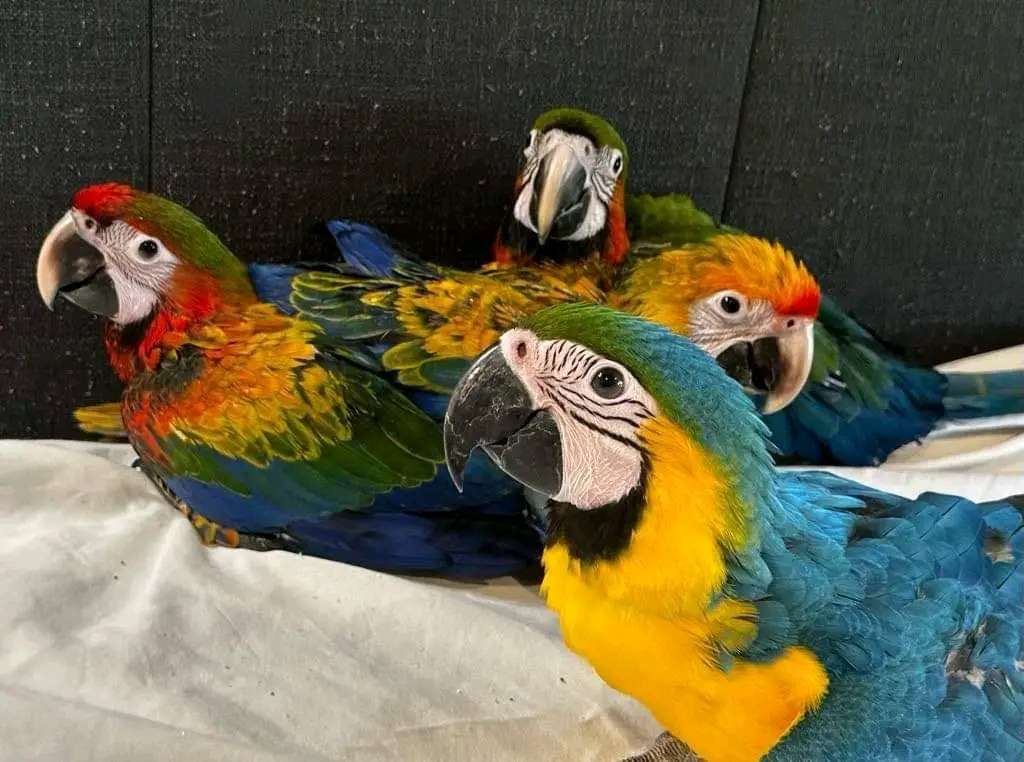- by FPABS-Admin
- 0
- Posted on
What Macaw Parrots Need
What Macaw parrots are known for their large size and playful nature. They are native to Central and South America, where their diverse diet consists of fruits, nuts, seeds, and more. To replicate this balanced diet, pet owners should focus on several key components that contribute to their health.
Key Components of a Healthy Diet
Fresh Fruits and Vegetables
Fruits and vegetables are vital components of a healthy diet for macaw parrots. These foods should form a substantial part of your macaw’s diet. Aim for a variety:
- Fruits: Apples, bananas, grapes, and berries are excellent choices. Ensure they are fresh and free from pesticides.
- Vegetables: Leafy greens like kale, spinach, and dandelion greens are rich in nutrients. You can also include carrots, bell peppers, and broccoli.
Fruits and vegetables provide essential vitamins and minerals while keeping your macaw hydrated.
Pelleted Diets
What Macaw Parrots Need a well-formulate pellet diet can be an essential foundation for macaws. Pellets are designed to provide balanced nutrition in a convenient form. Look for high-quality pellets that include various grains, seeds, and vitamins. These pellets should make up about 60-70% of their daily intake.
When transitioning your macaw to pellets, do so gradually to ensure they accept this new food without stress.
Nuts and Seeds
While nuts and seeds are popular treats for macaws, they should be offered in moderation due to their high fat content. Safe options include:
- Nuts: Almonds, walnuts, and pistachios. Ensure they are unsalted and offered in small quantities.
- Seeds: Sunflower seeds can be a favorite; however, limit their intake and balance it with other food types to avoid excessive fat consumption.
Proteins
Proteins play a vital role in your macaw’s diet, supporting growth and maintenance. Include sources of protein like:
- Cooked legumes: Beans and lentils can be excellent protein sources.
- Eggs: Hard-boiled eggs can be a tasty treat.
- Cooked chicken or fish: Small portions can also be introduced occasionally.
It’s important to avoid overfeeding proteins as too much can lead to obesity and other health issues.
Foods to Avoid
Understanding what not to feed your macaw is as important as knowing what to provide. Some foods can be toxic or harmful. Avoid:
- Chocolate: Highly toxic and can cause severe reactions.
- Avocado: Contains persin, which is harmful to birds.
- Caffeine: Found in coffee, tea, and certain sodas, this can lead to hyperactivity and heart issues.
- High-fat foods: Items like potato chips or fried foods should never make it into your parrot’s diet.
Consult reputable resources or a veterinarian if you are unsure about specific foods.
Hydration for Your Macaw
Water is an essential part of your macaw’s diet. Always provide fresh, clean water daily, as hydration is crucial for their health. You can use a water bottle or a shallow bowl that allows them to drink easily. Monitor their water intake — macaws should drink regularly to stay hydrated, especially in warm conditions.
Supplements for a Balanced Diet
While a balanced diet can cover most of your macaw’s nutritional needs, additional supplements may be necessary. Consider:
- Calcium and vitamin D3: Important for bone health, especially for breeding or older birds.
- Omega-3 fatty acids: Helpful for maintaining healthy feathers and skin.
- Probiotics: Promotes a healthy digestive system.
Always consult with an avian veterinarian before adding supplements to ensure they are necessary and safe for your macaw.
Conclusion
Understanding the diet essentials for healthy macaw parrots helps you provide a foundation for a long and vibrant life. With a balanced mix of fresh produce, pellets, proteins, and the avoidance of harmful foods, your macaw can thrive and bring joy to your home. A proper diet is key to their health, influencing everything from feather quality to their energy levels.
For best results, stay informed and be proactive about your macaw’s dietary needs. Let’s keep those colorful feathers vibrant and those cheerful squawks coming — engage with us in the comments below about your experiences in feeding your macaw!
